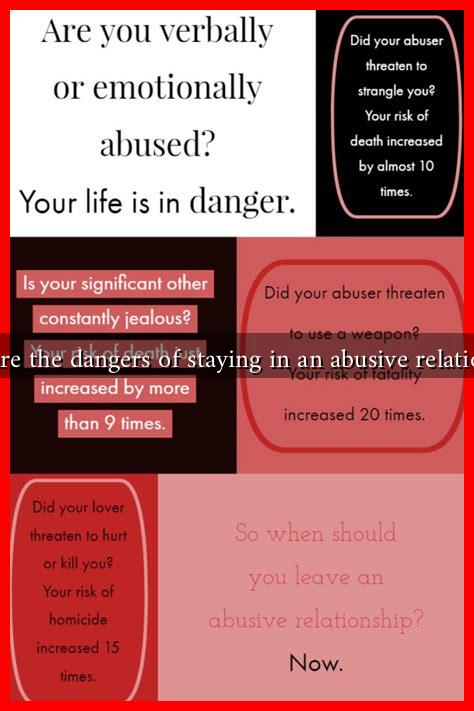-
Table of Contents
The Dangers of Staying in an Abusive Relationship
Abusive relationships can take many forms, including physical, emotional, psychological, and financial abuse. While leaving such a relationship can be incredibly challenging, staying in one can have dire consequences. This article explores the dangers of remaining in an abusive relationship, highlighting the physical, emotional, and social repercussions that can arise.
Understanding Abuse
Abuse is not always visible; it can manifest in various ways. According to the National Coalition Against Domestic Violence (NCADV), nearly 1 in 4 women and 1 in 9 men experience severe intimate partner physical violence. Understanding the different types of abuse is crucial for recognizing the signs and the dangers of staying in such relationships.
- Physical Abuse: This includes hitting, slapping, or any form of physical harm.
- Emotional Abuse: This involves manipulation, gaslighting, and constant criticism.
- Psychological Abuse: This can include threats, intimidation, and controlling behavior.
- Financial Abuse: This occurs when one partner controls the other’s access to financial resources.
The Physical Dangers
One of the most immediate dangers of staying in an abusive relationship is the risk of physical harm. Victims may experience:
- Increased Severity of Violence: Abuse often escalates over time. What starts as emotional manipulation can lead to physical violence.
- Chronic Health Issues: Victims may suffer from long-term health problems, including chronic pain, gastrointestinal issues, and cardiovascular diseases.
- Increased Risk of Homicide: According to the NCADV, women in abusive relationships are at a higher risk of being killed by their partners.
The Emotional Toll
Staying in an abusive relationship can have severe emotional consequences. Victims often experience:
- Depression and Anxiety: Constant fear and stress can lead to mental health disorders.
- Low Self-Esteem: Abusers often use emotional manipulation to undermine their partner’s self-worth.
- Post-Traumatic Stress Disorder (PTSD): Many victims develop PTSD, which can manifest as flashbacks, nightmares, and severe anxiety.
For example, a study published in the Journal of Interpersonal Violence found that women who experienced intimate partner violence were significantly more likely to report symptoms of PTSD compared to those who had not experienced such violence.
Social Isolation
Abusers often isolate their victims from friends and family, making it difficult for them to seek help. This isolation can lead to:
- Loss of Support Systems: Victims may find themselves cut off from friends and family who could provide emotional and practical support.
- Increased Dependence on the Abuser: Isolation can create a cycle of dependence, making it harder for victims to leave.
- Stigmatization: Victims may feel ashamed or embarrassed about their situation, further isolating themselves.
Financial Consequences
Financial abuse is a common tactic used by abusers to maintain control. Victims may face:
- Loss of Financial Independence: Abusers may restrict access to money, making it difficult for victims to leave.
- Debt Accumulation: Victims may incur debt due to the abuser’s spending habits or coercion.
- Job Loss: Emotional and physical abuse can affect job performance, leading to unemployment.
Conclusion
Staying in an abusive relationship poses significant dangers that can affect every aspect of a victim’s life. From physical harm to emotional distress, social isolation, and financial instability, the consequences are far-reaching. It is crucial for victims to recognize the signs of abuse and seek help. Resources such as the National Domestic Violence Hotline (1-800-799-7233) provide confidential support and guidance for those in need.
Ultimately, understanding the dangers of remaining in an abusive relationship is the first step toward breaking free. If you or someone you know is in an abusive situation, remember that help is available, and you are not alone.

